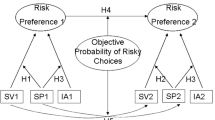Abstract
Entrepreneurs are often thought to engage in "risky" behaviors. Thus, they may be seen as more willing than average to take risks. We offer a dissenting view. Central to entrepreneurship is the alertness perspective which suggests that entrepreneurs may assess opportunities and threats differently than non-entrepreneurs. That differential assessment may be understood in terms of Bayesian probability. The Bayesian model argues that differing assessments of prospective outcomes may be attributable to differences in prior information. This perspective on risk assessment has implications for entrepreneurial decision making, whether to launch a new venture or adopt a growth strategy. The literature is reviewed, a synthesis is offered, a numerical example is developed, and a research agenda is proposed.
Similar content being viewed by others
References
Barney, J., 1991, ‘Firm Resources and Sustained Competitive Advantage’, Journal of Management 17(1), 99-120.
Boekholt, P., 1996, ‘Financing Innovation in the Post-subsidy Area Public Support Mechanisms to Mobilize Finance for Innovation’, International Journal of Technology Management 12(7), 760-768.
Brockhaus, R. H., Sr., 1980, ‘Risk Taking Propensity of Entrepreneurs’, Academy of Management Journal 23(3), 509-520.
Chen, S. and W. T. Moore, 1985, ‘The Expected Net Present Value Rule under Informative and Noninformative Prior Distributions’, Advances in Financial Planning and Forecasting 1, 209-224.
Eisenhardt, K. M. and M. J. Zbaracki, 1992, ‘Strategic Decision Making’, Strategic Management Journal 13, 17-39.
Gardenfors, P. and N. Sahlin, 1988, Decision, Probability, and Utility, New York: Cambridge University Press.
Gomez-Mejia, L. R. and D. B. Balkan, 1989, ‘Effectiveness of Individual and Aggregate Compensation Strategies’, Industrial Relations 28(3), 431-445.
Hills, G. E., G. T. Limpkin and R. P. Singh, 1997, Opportunity Recognition: Perceptions and Behaviors of Entrepreneurs. Paper presented at the Babson-Kauffman Foundation Entrepreneurship Research Conference. Wellesly, MA.
Kirzner, I. M., 1985, Discovery and the Capitalist Process, Chicago: University of Chicago Press.
Knight, Frank H., 1921, Risk, Uncertainty and Profit. Reprinted 1994, Augustus M. Kelley, New York.
Masters, R. and R. Meier, 1988, ‘Sex Differences and Risk Taking Propensity of Entrepreneurs’, Journal of Small Business Management 26(1), 31-35.
Mahoney, J. T. and J. R. Pandian, 1992, ‘The Resource-based View within the Conversation of Strategic Management’, Strategic Management Journal 13(5), 363-380.
Mitton, D. G., 1989, ‘The Compleat Entrepreneur’, Entrepreneurship Theory and Practice 13(3), 9-19.
Palich, L. E. and D. R. Bagby, 1995, ‘Using Cognitive Theory to Explain Entrepreneurial Risk-taking: Challenging Conventional Wisdom’, Journal of Business Venturing 10, 425-438.
Porter, M. E., 1980, Competitive Strategy, New York: The Free Press.
Pratt, J. W., H. Raiffa and R. Schlaiffer, 1995, Introduction to Statistical Decision Theory, Cambridge: MIT Press.
Rice, M. P. and D. J. Kelley, 1997, Opportunity Recognition: Defining the Attributes of Discontinuous Innovation as a Starting Point for New Business. Paper presented at the Babson-Kauffman Foundation Entrepreneurship Research Conference. Wellesly, MA.
Schumpeter, J. A., 1934, The Theory of Economic Development, Cambridge, MA: Harvard University Press.
Shaver, K. G. and L. R. Scott, 1991, ‘Person, Process, Choice: The Psychology of New Venture Creation’, Entrepreneurship Theory and Practice 16(2), 23-45.
Stewart, A., 1991, ‘A Prospectus on the Anthropology of Entrepreneurship’, Entrepreneurship Theory and Practice 16(2): 71-91.
Stogdill, R. M., 1974, Handbook of Leadership. A Survey of Theory and Research, New York: The Free Press.
Tversky, A. and D. Kahneman, 1978, ‘Judgement and Uncertainty: Heuristics and Biases’, in P. Diamond and M. Rothschild (eds.), Uncertainty in Economics, New York: Academic Press.
Author information
Authors and Affiliations
Rights and permissions
About this article
Cite this article
Norton, W.I., Moore, W.T. Entrepreneurial Risk: Have We Been Asking the Wrong Question?. Small Business Economics 18, 281–287 (2002). https://doi.org/10.1023/A:1015231318265
Issue Date:
DOI: https://doi.org/10.1023/A:1015231318265




